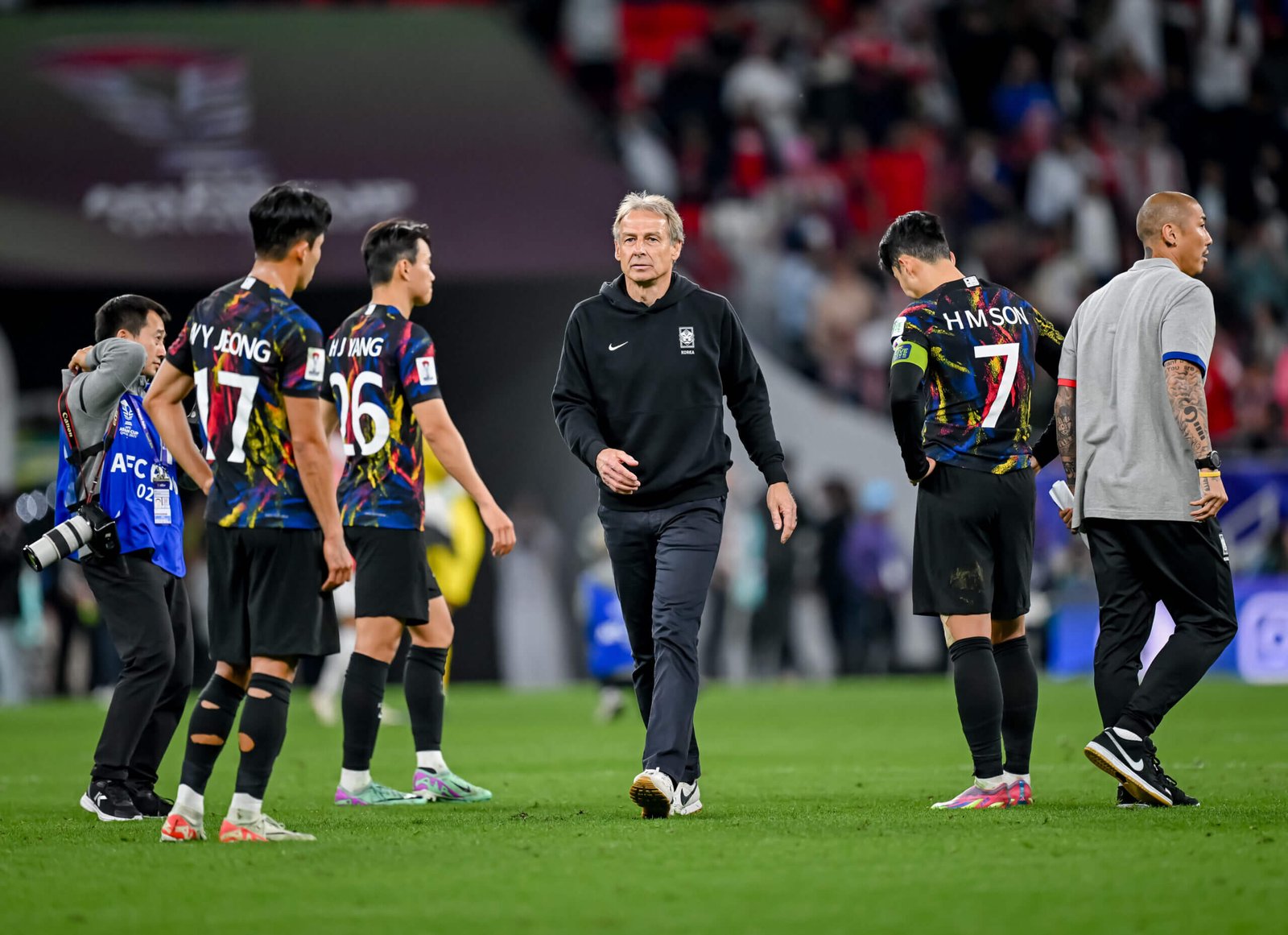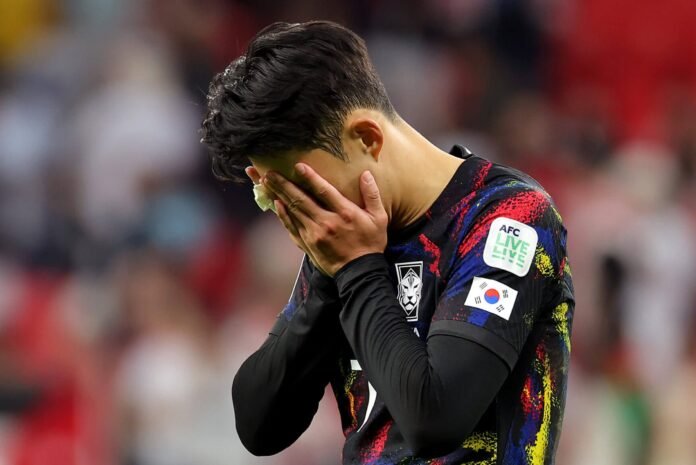South Korea had made such a habit of scoring dramatic, late, game-saving goals in the Asian Cup their style had been dubbed “zombie football”.
In their last-16 game against Saudi Arabia, a stoppage-time equaliser saved them and they ended up winning on penalties.
In the quarters, more of the same: a 96th-minute penalty from Hwang Hee-chan of Wolverhampton Wanderers took them to extra-time against Australia before Son Heung-min’s delectable free kick won it.
They also scored twice in stoppage time in the group stages when stumbling to draws against Jordan and Malaysia. Back from the dead, time and again. Zombie football.
But in the semi-finals, meeting Jordan once more, their luck ran out. A deserved 2-0 defeat and utter humiliation in Qatar. No Son of the Dead, no 28 Goals Later.
South Korea, who had been unconvincing throughout the tournament, relying on moments of genius from their star players but seemingly lacking a coherent tactical plan, produced a pretty atrocious performance against Jordan, a nation ranked 87th in the world.
“It is very disappointing. I am devastated about this result. Jordan are having an amazing journey this tournament,” said a devastated Son. “They are incredible and they deserve it. They have been fighting until the end but for us, it was very disappointing”
Jordan had never before beaten South Korea but were convincing winners, attacking them from the off and overwhelming the tournament favourites with a plan based on hyper aggression, relentless pressing, counter attacks and a bombardment of goalkeeper Jo Hyeon-woo’s goal. Jo made so many good saves he was South Korea’s player of the match.
Jordan celebrate in Qatar (Photo: Markus Gilliar – GES Sportfoto/Getty Images)
At half-time Jordan had registered 12 shots to South Korea’s four. This is South Korea with a front three featuring Son and Hwang, fourth and joint-seventh in the Premier League top scorers list respectively, plus the gifted Lee Kang-in of PSG. And they offered next to nothing.
Son had 15 touches in the first half, the lowest of anyone on the pitch, as a ponderous and idealess South Korea wilted, particularly in midfield where they were outfought.
All of which reflected horribly on their manager, Jurgen Klinsmann, who was under a glaring spotlight of scrutiny coming into the tournament amid accusations of old fashioned 4-4-2 tactics which seemed to centre around waiting for Son to do something amazing. There was also the impression that Klinsmann, who unlike his predecessors had not moved to live in South Korea (staying in the US), was phoning the job in.
Watching a limp and lifeless performance in such an important game, with huge pressure from back home to deliver a first Asian Cup trophy since 1960, it was inescapable to avoid the impression that the players were either playing for themselves, or for Son, but probably not for Klinsmann and certainly not to any coherent plan.
There was no hint of a late comeback this time. Substitute striker and one-time World Cup heartthrob Cho Gue-sung desperately tried for another zombie South Korea goal, in the 88th minute this time, attempting to win a penalty with a hilarious, Tom Daley-esque dive, for which he was booked and mustered no complaints. It summed up an embarrassing night. South Korea failed to register a single shot on target.
Klinsmann’s managerial career has nosedived since, as a fresh-faced 40-year-old, he took Germany to the semi-finals of their home World Cup in 2006. He left the USA in 2016 after an awful start to their World Cup qualification campaign and his only proper job since then lasted 10 weeks at Hertha Berlin. No 59, he smiled ruefully at full-time, something he had been lambasted for after the 3-3 draw against Malaysia in the group stages. It was not a great look, akin to a man who to be frank, looked like he had no idea to prevent what had just happened.

Klinsmann’s team ran out of late escapes (Photo: Markus Gilliar – GES Sportfoto/Getty Images)
There are two stories here, the other being a heroic, herculean run to the final by Jordan. They had never previously reached the semi-final of any international tournament, but will now face either hosts Qatar or Iran (who knocked out the pre-competition favourites Japan in the quarters) in Saturday’s final.
They are managed by a Moroccan, Hussein Ammouta, who is already a national hero back home after engineering victories over Iraq and Tajikistan in the knockout stages having got through the groups as one of the best third-placed teams.
In fact their run emulates Morocco’s stunning success in the World Cup and, like with Morocco, they are a disciplined, incredibly well-drilled side who prey on the weaknesses of their opponents. Jordan had a team-based plan and stuck to it. South Korea did not.
Klinsmann had told his stuttering team to “relax” ahead of the game and his players took his advice very literally, playing numerous slack passes and giving the ball away in midfield time and again.
One of those occasions led to the first goal when Kim Young-gwon played a short pass, latched onto by the tenacious Musa Al-Taamari who fed Yazan Al-Naimat and he finished with a gorgeous chip over Jo in the 53rd minute.
It was Al-Taamari, Jordan’s only European-based player having moved to Montpellier in France last summer after stints in Cyprus and Belgium, who scored the crucial second goal 13 minutes later, jinking by a couple of non-existent challenges before firing into the corner from 20 yards.
A partisan, Jordan-heavy crowd went berserk. They lost 6-1 to Japan in a warm-up friendly before the tournament and, in the past year, had been defeated by Lebanon and Azerbaijan and thumped 6-0 by Norway. This was not supposed to happen.
It was undoubtedly one of the greatest moment in Jordan’s football history, if not the greatest. Even better may come on Saturday.
Conversely it was one of the lowest moments that South Koreans will be able to recall, certainly in recent decades and particularly given the immense talent at Klinsmann’s disposal with players from PSG, Spurs, Wolves and Bayern Munich in his squad. The vast majority of Jordan’s players play in the Jordanian league.
Jordan’s first ever title is within their grasp, but South Korea’s long wait for an Asian Cup triumph will extend at least to the 2027 tournament in Saudi Arabia, some 67 years since they last won it. Will Klinsmann be there? More chance of a zombie apocalypse.
(Photo: Lintao Zhang/Getty Images)
Read the full article here


